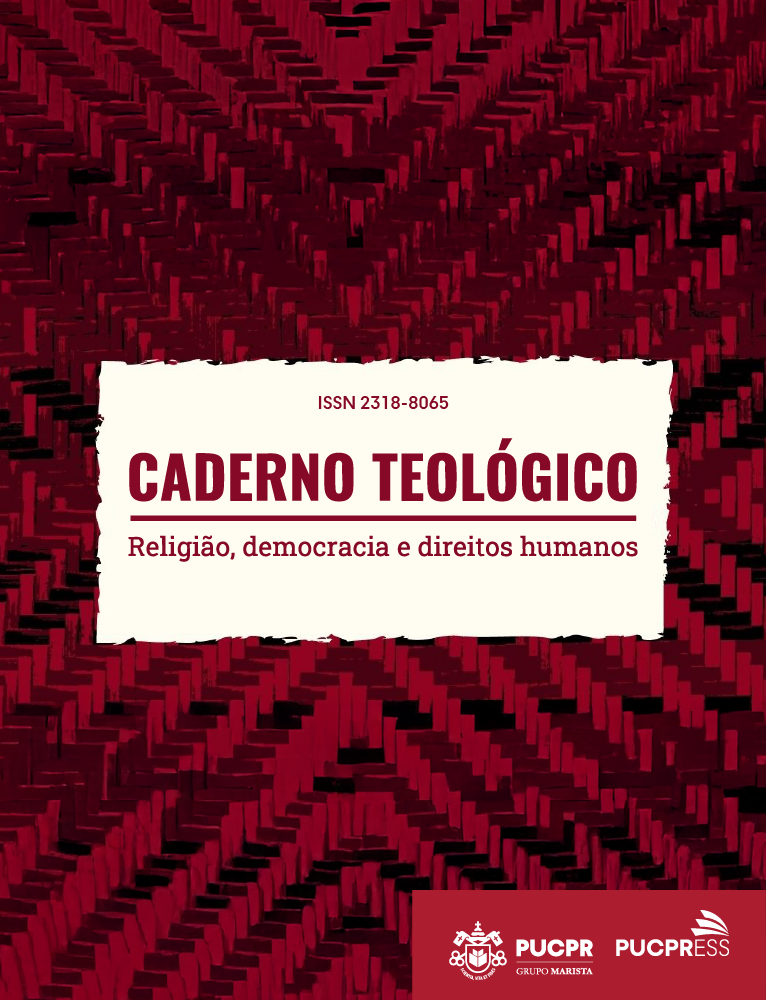Laicidade, gênero e suas implicações no Estado Democrático de Direito: A necessidade de uma ecologia integral | Laicity, gender and their implications for the Democratic Rule of Law: The need for an integral ecology
DOI:
https://doi.org/10.7213/2318-8065.06.01.p55-65Resumo
Em 10 de julho de 2019, Jair Messias Bolsonaro disse: “Muitos tentam nos deixar de lado dizendo que o estado é laico. O estado é laico, mas nós somos cristãos. (...) Por isso, o meu compromisso: poderei indicar dois ministros para o Supremo Tribunal Federal. Um deles será terrivelmente evangélico”. O tema do presente artigo, portanto, é o estado laico na República Federativa do Brasil diante do incitamento político de algumas religiões em detrimento de outras e a notória influência histórica que algumas crenças apresentam com relação ao aspecto do gênero. O objetivo geral é analisar como a violação ao estado laico influencia nas questões do gênero feminino e, consequentemente, viola o Estado Democrático de Direito. Para tanto, os objetivos específicos são: a) analisar o Estado Democrático de Direito e o princípio do estado laico; b) analisar os requisitos para compor o Supremo Tribunal Federal; e c) analisar a influência de crenças religiosas com relação ao gênero feminino. A metodologia a ser utilizada é de pesquisa qualitativa, por intermédio de um método indutivo com análise documental. A presente pesquisa apresentou como resultado a violação ao Estado Democrático de Direito, em 2019, acerca da laicidade do estado, que feriu diferentes princípios constitucionais.
On July 10, 2019 Jair Messias Bolsonaro said: “Many try to leave us aside saying that the state is secular. The state is secular, but we are Christians. (...) Therefore, my commitment: I will be able to appoint two ministers to the Federal Supreme Court. One of them will be terribly evangelical.” The theme of this article, therefore, is the secular state in the Federative Republic of Brazil, in view of the political incitement of some religions to the detriment of others, and the notorious historical influence that some beliefs have in relation to the aspect of gender. The general objective is to analyze how the violation of the secular state influences women's issues and, consequently, violates the Democratic Rule of Law. Therefore, the specific objectives are: a) to analyze the Democratic Rule of Law and the principle of the secular state; b) analyze the requirements to compose the Federal Supreme Court; and c) analyze the influence of religious beliefs regarding the female gender. The methodology to be used is qualitative research, through an inductive method with document analysis. The present research presented as a result the violation of the Democratic Rule of Law, in 2019, concerning the secularity of the state, that hurt different constitutional principles.
Downloads
Referências
ALENCAR, Gedeon Freire de. Jair Messias Bolsonaro: o" eleito" de Deus? Revista Brasileira de História das Religiões, v. 13, n. 37, p. 161-175, 2020.
BARROS, José d'Assunção. Igualdade, desigualdade e diferença: em torno de três noções. Análise social, n. 175, p. 345-366, 2005.
BARROSO, Luis Roberto. Curso de Direito Constitucional Contemporâneo: os conceitos fundamentais e a construção do novo modelo. 4 ed. São Paulo: Saraiva, 2013.
BOBBIO, Norberto. Cultura laica y laicismo. 1999. Disponível em: http://www.elmundo.es/1999/11/17/opinion Acesso em: 29 nov. 2020.
BOLSONARO. Disponível em: <https://www.bolsonaro.com.br/>, acesso em: 23 jul. 2020.
BONATTO, Marina; KOZICKI, Katya. AUTONOMIA PRIVADA: ENTRE CORTES E LEGISLADORES. In: SILVA, Christine Oliveira Peter da, et al. Constitucionalismo Feminista. Salvador: Editora JusPodivm, 2018.
BONETI, Lindomar Wessler. Políticas públicas por dentro. 4 ed. rev. Ijuí: Ed. Unijuí, 2018.
BRASIL. CONSTITUIÇÃO DA REPÚBLICA FEDERATIVA DO BRASIL DE 1988. Disponível em: <http://www.planalto.gov.br/ccivil_03/constituicao/constituicao.htm>, acesso em: 22 jul. 2020.
BRASIL. ODM Brasil. Disponível em: <http://www.odmbrasil.gov.br/os-objetivos-de-desenvolvimento-do-milenio>. Acesso em: 26 ago 2019.
BRASIL. TRANSFORMANDO NOSSO MUNDO: A AGENDA 2030 PARA O DESENVOLVIMENTO SUSTENTÁVEL. Disponível em: <http://www.mds.gov.br/webarquivos/publicacao/Brasil_Amigo_Pesso_Idosa/Agenda2030.pdf>. Acesso em: 26 ago 2019.
G1. Bolsonaro diz que vai indicar ministro 'terrivelmente evangélico' para o STF. Disponível em: <https://g1.globo.com/politica/noticia/2019/07/10/bolsonaro-diz-que-vai-indicar-ministro-terrivelmente-evangelico-para-o-stf.ghtml>, acesso em: 21 jul. 2020.
MACHADO, Maria das Dores Campos. O discurso cristão sobre a “ideologia de gênero”. Revista Estudos Feministas, v. 26, n. 2, 2018.
NOVAIS, Jorge Reis. Contributo para uma teoria do estado de direito. Coimbra (Portugal), 2006.
O GLOBO. Bolsonaro prioriza lideranças evangélicas em agenda e políticas públicas. Disponível em: <https://oglobo.globo.com/brasil/bolsonaro-prioriza-liderancas-evangelicas-em-agenda-politicas-publicas-24251808>, acesso em: 28 jul. 2020.
PINTO, Céli Regina Jardim. Elementos para uma análise de discurso político. Barbarói, p. 78-109, 2006.
PSL. Disponível em: <https://psl.org.br/?page_id=27>, acesso em: 23 jul. 2020.
PUCCINELLI JÚNIOR, André. Curso de direito constitucional. 2 ed. São Paulo: Saraiva, 2013.
SILVA, José Afonso da. Curso de direito constitucional positivo. 33 ed. rev e atual. São Paulo: Editora Malheiros, 2009.
VATICANO. Carta encíclica Laudato Si do Santo Padre Papa Francisco sobre o Cuidado da Casa Comum. 2015. Disponível em: http://www.vatican.va/content/francesco/pt/encyclicals/documents/papa-francesco_20150524_enciclica-laudato-si.html. Acesso em: 30 nov. 2020.
Zanatta, Luiz Fabiano et al. Igualdade de gênero: por que o Brasil vive retrocessos? Cadernos de Saúde Pública. 2016, v. 32, n. 8. Disponível em: https://doi.org/10.1590/0102-311X00089616, Acesso em 25 nov. 2020.
WEBER, Rosa. Prefácio. In: SILVA, Christine Oliveira Peter da, et al. Constitucionalismo Feminista. Salvador: Editora JusPodivm, 2018.









